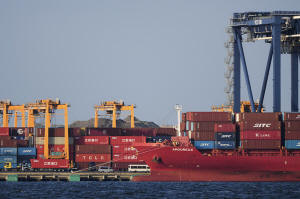|
Japanís real gross domestic product, or the measure of a
nationís goods and services, shrank at a greater-than-expected
0.2% in January-March compared to the previous quarter in the
first contraction in a year, the Cabinet Officeís seasonally
adjusted preliminary data showed.
Exports declined at an annual rate of 2.3%. Consumer spending
remained flat, while capital investment grew 5.8%.
Trumpís tariffs are likely to hurt Japanís giant exporters,
especially the automakers, not only for products shipped from
Japan, but from other nations, like Mexico and Canada. Officials
acknowledge planning a response is a challenge because Trump
keeps changing his mind.
ďRegional automakers face increased operating costs and
potential revenue losses because their U.S. sales depend on
diverse production bases and supply chains,Ē S&P Global Ratings
said in a report.
ďEven companies with minimal sales in the U.S. could face
indirect but meaningful impacts as tariffs affect global economy
and consumer demand," it said.
The Japanese economy has been struggling for years, plagued by
weak demand as the population ages and declines, as more people
stay single and have fewer children.
The Bank of Japan, which kept interest rates at zero or minus
levels for years, has been gradually raising the benchmark rate,
noting wages are holding up and prices are gradually rising.
The latest findings, which seem to highlight the fragility of
the economy, make it more likely the central bank might hold off
on further rate hikes.
Some analysts are advocating lowering the 10% consumption tax,
which is similar to the sales tax in other nations, to help
alleviate peopleís hardships.
But so far Prime Minister Shigeru Ishiba hasnít said he supports
the idea. Japan's national finances are under severe strain due
to ballooning social welfare costs.
The economy grew an annual rate of 2.4% in the last quarter of
2024.
All contents © copyright 2025 Associated Press. All rights reserved

|
|




